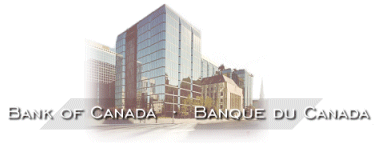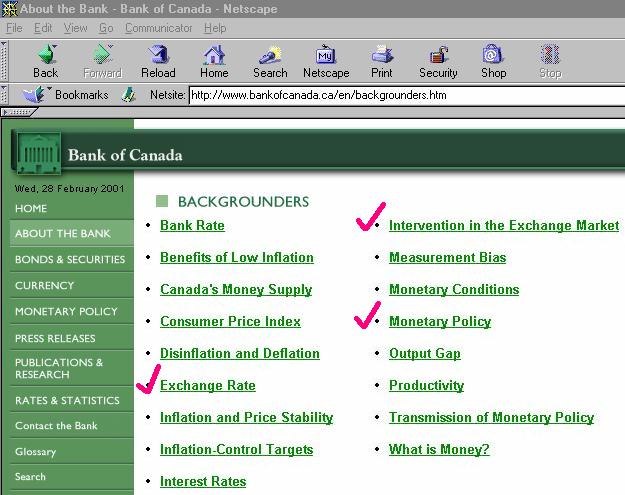For the section(s) taught
by Prof. Tim Richardson
This
page last updated 2010 Feb 24 (links checked Feb 24th)
MGTC44
student Liran K. provided some updates on the correct URLs

| Role
of the Central Banks
For the section(s) taught
by Prof. Tim Richardson
|
 |
| INTRODUCTION | This unit could
be considered
|
 |
Below is a screen capture
from the Bank of Canada's website
This section is titled "Backgrounders" This page used to be available in up to 2004 but it has been replaced by this page in 2005 listing several resources www.bankofcanada.ca/en/about/edu_resources.html (still linked in Feb 2010) there is a section titled "Why Monetary Policy Matters: A Canadian Perspective" - it is useful to read re: C44 |

Canadian monetary policy
- see http://www.bankofcanada.ca/en/monetary_mod/index.html
see also http://www.bankofcanada.ca/en/backgrounders/bg-p6.html
.
| How
It
Works |
Intervention
in the Exchange Market
read www.bankofcanada.ca/en/backgrounders/bg-e2.htm (URL check Nov 2005 - OK; June 2007, still OK) "If the Bank wants to moderate a decline in the price of the Canadian dollar, it will buy dollars in foreign exchange markets in exchange for other currencies, mainly U.S. dollars. This boosts demand for Canadian dollars and helps support the dollar's value. ... if the Bank feels the dollar's value is rising too quickly, it can sell Canadian dollars. By selling dollars, the Bank increases the supply of Canadian dollars in foreign exchange markets and this tends to moderate the rise in the value of the dollar." |
| High
or Low ? KEY
(added
|
"The actions
of the bank are a consequence of the political environment - meaning
what the Finance Minister and the Prime Minister think is in the best interests
of the Canadian economy. The economic environment has a big influence
in their decision - but ultimately, they have to make a choice.
If they think certain sectors
of the economy are depending on exports, then it is in our best interests
to have a low dollar, but some economic specialists may advise that
it is in our best interests to be able to import products cheaply
The reason I (WTGR) said it is "political" is because different parts of Canada have a different economic environment which depends differently on exports vs imports. In some parts of Canada, the economy is heavily dependent on exporting resources and resource based products. In central Canada (meaning Ontario) we import a variety of things and therefore a high dollar is better, especially if those imports are used to make something to export, it can help make our export price more competitive. The government makes decisions based on the opinion of the ruling political party, and the main purpose of the ruling party is to get re-elected. So you can see that a government policy about currency appreciation, or decline, is both politically based and economically influenced according to domestic considerations and international opportunities. note TD's comments June 2007
WTGR |
|
|
CONTACT I MAIN PAGE I NEWS GALLERY I E-BIZ SHORTCUTS I INT'L BIZ SHORTCUTS I MKTG&BUSINESS SHORTCUTS I TEACHING SCHEDULE |
| . | |
| MISTAKES I TEXTS USED I IMAGES I RANK I DISCLAIMER I STUDENT CONTRIBUTORS I FORMER STUDENTS I | |
| . |
Prof. W.
Tim G. Richardson © www.witiger.com ![]()